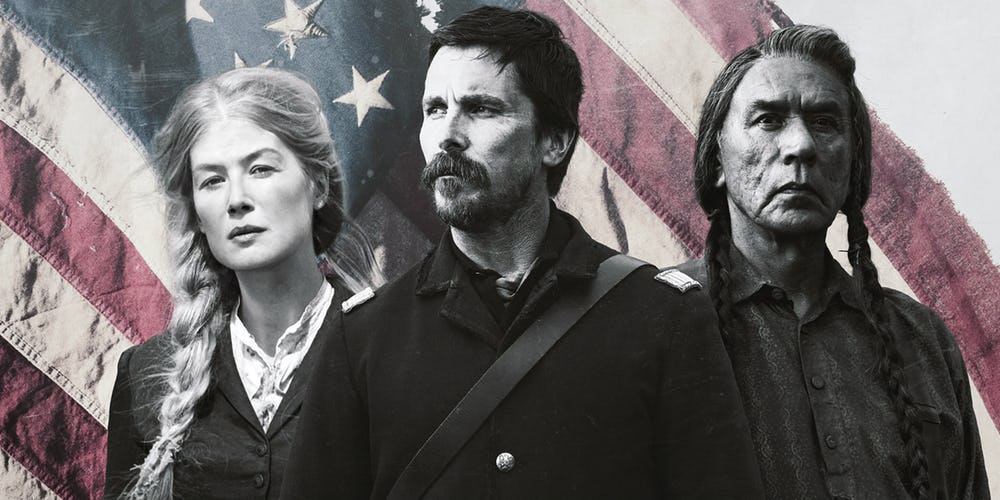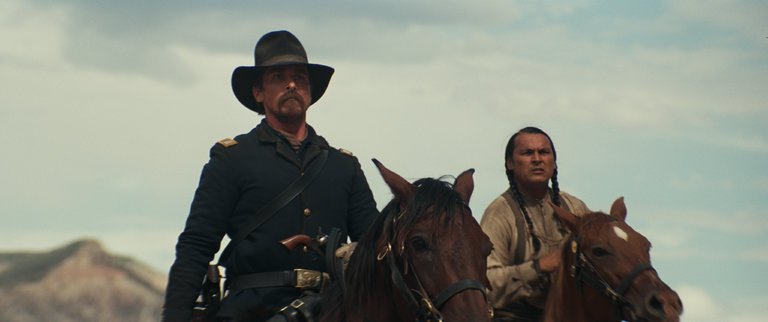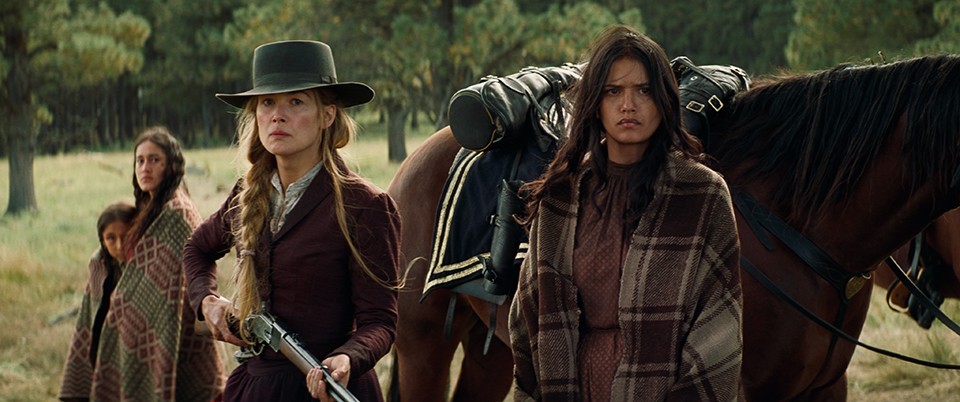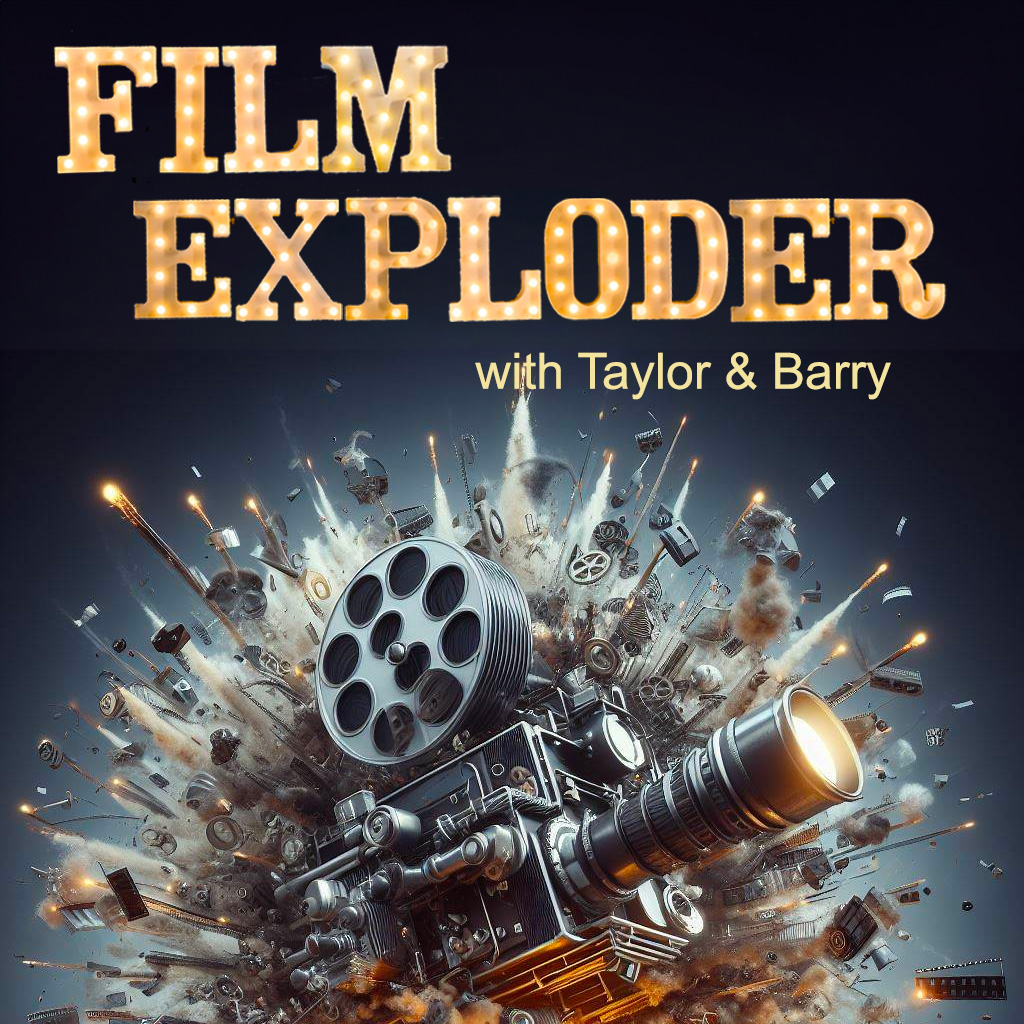Ok, so the title smacks of epic hyperbole, but I am standing by it. And in due time I’ll explain fully why, and justify why I believe it could be one of the best westerns ever. Mostly it has to do with the single fact that the movie takes on the contradictions… and the complications,… hold on, the two things this movie takes on are the contradictions, and the complications, and the cowardliness of the… I’ll come in again. (Reference?) Whatever, you get my point, Hostiles makes clear just how complicated the west was and how filled with contradictions. Racism, and racists live side by side with legends? How can that be? But trust me when I say it’s a fantastic movie with serious passion, pathos and a true thoughtful interior under all the fantastically choreographed gun fights etc. So let’s get on with it shall we – “Why Hostiles Might Be The Best Western Ever”. Watch it right here at one of these online locations:
What is this Movie Hostiles You Speak of?
Great question internet denizen. The idea is simple enough. You can find it here here or here. Captain Joseph Blocker (Christian Bale) has been ordered to accompany his old arch nemesis, the dying Cheyenne chief, Yellow Hawk. You learn more about their relationship later, but needless to say, Mr. Blocker? Oh he hates Mr. Chief Yellow Hawk. Like bad. So when he’s told to accompany the chief up to his ancestral lands up north. But his pension is on the line, so he agrees to do it. Along the way the pick up a few more stereotypical western characters (namely the mad-woman grieving mother, and mad-man Hannibal Lecter) as they head north on their journey. See simple enough? But in this mix of stereotypicalness lies a really interesting gambit, and it’s a stereotypicality busting sort of predisposition. Trailers always do a better job selling you guys on these movies than I do.
And because I’m lacking in friends of any sort in the real world, I like talking about the movies in detail in order to strike up a conversation. So maybe a few of you will join me in the comments to discuss the comings and goings of this film. But if you haven’t seen the movie yet? I’d kindly ask you to wander up to your local film establishment and purchase a ticket, then join us after the fact. You can even leave this tab open, it’ll be here when you get back! How fun is that?
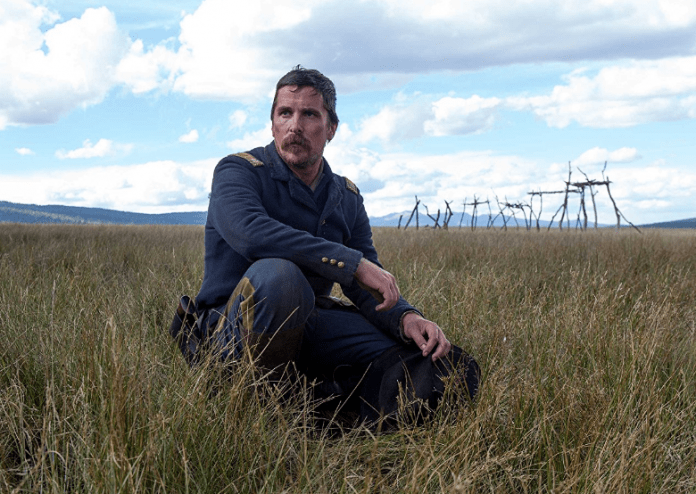
The Problem with American History and Hostiles
Before we start, I have to make a fairly jarring admission. I am something of a minor history buff. In college I remember I took my final and forgot to flip the page over. I just ripped through that test and walked out. Well it was an entirely freehand open ended essay test, and I should have failed the test miserably. But my teacher saw me in the quad and he was like, Mr. Holmes, um. You didn’t do half your test. I was mortified. So he says, without a pause, give me the five reasons for Sam Houston’s importance to Texas and to America. Uh. So I did, just spewing the bullet list I’d memorized for the test. Then he asked the next one I missed. And right there in the quad of Wheaton College I went from failing the class to pwning it. haha. I just love history.
But it wasn’t until just recently that it dawned on me just how jaded and awful our “history” really is. My wife and I are adopting 2 boys out of Haiti. And if you ever want to get a mind-wrecking education in what history really is all about, study the history of Haiti. Personally, I thought Columbus was a minor deity in the penumbra of American gods. I mean you have Abraham Lincoln. And Washington, and uh, then you have Columbus. I think those three may be the holy-triad of America. But when I dug in just the very littlest of bits, my mind was blown at how unconscionably evil Columbus was. Like, wait, WHAT IS GOING ON levels of evil.
For example, in his diary for the day of October 12th, 1492, Columbus wrote that the people of the Bahamas were filled with very friendly natives called the Taínos, and Arawaks. He wrote about how handsome and smart they were. Heck, he even made a big deal about their hospitality and how they never ever said no if asked for something. Better yet? They had no weapons, and when the Santa Maria (you know, the boat in the song you memorized in 3rd grade) shipwrecked, it was the Arawaks that helped unselfishly to help Columbus. So what is the first thing he did with the islanders? He seized their land for Spain and then enslaved them to work in his horrible gold mining efforts. Two years later? Half the population of the Bahamas were dead. Fast forward over to Haiti, same thing happened. Believing (incorrectly) there to be gold in the fields of Haiti, he and his men ordered everyone 14 years and older to collect gold every three months. Locals that didn’t collect enough had, oh wait for it, their hands cut off. But you know what? It was impossible. There was hardly any gold there to be found. So the natives fled into the hills, where they were hunted down and killed by the Spaniards.
So, if we were all sold a bill of goods about Columbus, where else were we mislead. Maybe we weren’t exactly told the truth about the glory of westerners in our fight against the Indians across the plains? Which brings us to Captain Joseph Blocker.
Character Study of Joseph Blocker in Hostiles
So, a deep dive on this movie would only work if we start by discussing the man the myth the legend, Captain Joseph Blocker, played by Christian Bale. Well, the movie kicks off in 1892, which happens to be near the end of the Indian Wars. Definitely one of America’s less great sections of history, (which I’ll get to in a second.) And apparently our hero, Capt. Blocker (come on, that is a fantastic archetypal name for our emotionally, um, blocked, hero) has spent his entire military career slaughtering Indians throughout the west. But this isn’t cave man brute, oh no. Not at all. Instead, he is a reader of Julius Caesar, in the original Latin no less. He is a “good” Christian following orders and working under a mantel of religious purity that, as a Christian myself, I had a hard time seeing any tongue in cheek to at all. He was spiritually motivated and didn’t lack for sleep as a result.
And it’s this character that makes this movie so good. Normally when I watch movies with “Christians” in them, they are laughable stereotypes, xeroxed interminably, and then regurgitated across the screenplay liberally. But here, Joseph Blocker was a gentleman, he was well read, and believed his cause to be legitimate. Several different times throughout the movie we see him care passionately about people and their betterment, but just not Indians. Heck, one of the most rousing moments of the film is Captain Blocker’s goodbye to one of his favorite men. Oh, who happens to be an African American. I only mention it because, for 1892, this isn’t insignificant. And it makes the viewer stop and say, wait, what? Like I said, this is a stereotypical western that destroys stereotypes. Alright, so we have a good feel for the complexities of our hero. He is a miasma of different awful stews and qualities. And yet, maybe even Blocker might find his unblocking and redemption by the end of this film? Hrmmm. We will see.
Quick Overview of the Details in Hostiles
As I mentioned up top, the setup is simple. Our infamous Joseph Blocker is now commissioned to take his nemesis on a trip, around the world and backkkkk… (ok, a little Depeche Mode slipped in there for a second. My bad.) And off they go. But just like that our captain stops the procession and he offers to fight the chief in a knife fight. But Yellow Hawk has none of that, and just lets the Captain know that he isn’t afraid to die. So no, our Captain, My Captain isn’t going to get the opportunity to gut this elderly Indian like a fish. Hrmmm. Maybe they have some bad blood? Maybe?
Soon though, Captain Blocker and Chief Yellow Hawk get a shared enemy when they come across a homestead that is in a charred and ruined pit. But they find a woman that is still alive, while the rest of the family has been murdered, scalped, etc etc. But why is Rosalie Quaid still alive? No idea. But regardless, the company is now +1. And quickly Yellow Hawk and the Captain realize that the home was attacked by Comanches.
And there in the first 30 minutes, I wrote in my notes, “The Powder Keg is Lit. Dang.” Because moments later, Rosalie, not entirely mentally stable, is brought back to their camp and sees the Indians there… and goes completely nuts. And a little bit later attempts to commit suicide. But soon, Elk Woman, offers Rosalie a dress and maybe we be seeing the beginnings of some reconciliation starting even though Indians murdered her family?
The Comanches and the Sans Arc Lakota Indians
And while I’m a bit of a student of history, Native American history just has never been my thing. So to see a movie depict the intra-Indian conflict and wars across the plains is fairly surprising to me. So I spent sometime reading several different historians talking about this bit of history unfamiliar to me. And apparently they denote the period before the Europeans arrival in North America as Contact? And it would seem that archaeological evidence suggests that Indians battled internally prior to contact and even more so as Europeans pushed them from the East into closer and closer proximity.
Now, apparently, Chief Yellow Hawk was a member of the delegations that signed the Medicine Lodge Treaty in 1868, 24 years prior to the the events of this movie. Yellow Hawk being the leader of the Sans Arc Lakota, which was a sub-group of the Cheyenne River Sioux. The point of these two treaties was to protect the Indian lands from further seizure on behalf of the United States Government. And apparently the contact-period war ceased a few of the long standing animosities between tribes which banded together for added protection through the 1860s and later. Alright, I’ll spare you the wanderings and ditherings here and there as I enjoyed reading more and more about the intrigues of these people and the details of their history. The bottom line? There were instances where the Lakota and the Comanches collided with each other, though they were rare, because of the buffer zone between the two constructed out of the areas of the Ute, Kiowa, and the Pawnee.
Can You Please Stay On Target?!?
Sorry, but I find it all so fascinating. So when they head out with Rosalie they are almost immediately attacked by the Comanche Indians. A few of their party are killed. But Yellow Hawk intervenes as best as he can while chained. And the Captain frees him as a result. One more indication of the thawing of Blocker’s heart. And when the company makes it to town they attempt to leave behind Rosalie, but Rosalie decides there is no one she’d rather be with than the Captain.
And along with that, Captain takes Sgt. Charles Willis (Ben Foster) along in order to have him hanged for murder. Which gives us the final piece of the puzzle as to the acrimony between Captain Blocker and Yellow Hawk. Apparently Willis, Blocker and Yellow Hawk, all fought together at the battle of Custard’s Last Stand. But the key detail here is that Willis and Blocker are both Indian murderers and that the line between them is arbitrary at best… and therefore they probably both deserve to be hanged.
As the movie barrels towards the ending, the women of the group are captured by several fur traders. And the company was able to track the traders through the help of Yellow Hawk and kill them in their sleep. (And in a side note, Wills convinces them to release his changes, and in response he kills Kidder and then escapes. A bit later he’s tracked down and killed by Metz, who then takes his own life.) And in the final action of the movie, Blocker successfully delivers Yellow Hawk to his family’s lands only to be interrupted by the new American land owners of the place telling them to get off his land. Gunpowder ensues, and the only people left standing are Rosalie, Blocker and Little Bear. And in the final moments, Rosalie and Little Bear head to Chicago, only to have Blocker board the train at the very last moment.
What Does the Ending of Hostiles Mean?
Literal Interpretation of Hostiles
It literally is a “real” retelling of a story that could have actually happened in the west. It’s creators (specifically Scott Cooper here), selected a section of history, pulled specific key actors from this time period, and made the most realistic story possible with them. Instead of over simplifying, Cooper’s goal and objective was just to tell a super realistic story set in the West in the late 19th century.
Who Are Hostiles Interpretation of Hostiles
Why is it called, Hostiles? And why did the Marketing department set the tagline as “We Are All Hostiles”? If every single character and prime mover in this script is a hostile (never mind you and me in the theater seats, we’ll get to that), then we should be able to walk that back and list who each one is hostile to. Each character is antagonistic to some other people or person over the course of this film. And I literally can’t think of a case where this isn’t true. Even the Lakotas were hostile to the Comanches. No one is spared hostility to others. Even Rosalie is hostile to the Indians that took her family, but also herself. And then ultimately to her own people as she doubles back on herself in the end.
Which brings us to you, to me, sitting in the theater seats, and wondering, are we hostile too? Yeah, the point to this particular view is that you and I may be more modern than the primitive people in this script, but we too are hostiles to others around us everyday. Is that racism? Bigotry? Personal hatred for another? Do we see ourselves in this film because this theory says that it’s an indictment of you and me both as well as the characters on the screen.
A Deconstructionist’s View of Hostiles
Could it be that this movie has no meaning in itself, outside of it’s desire to deconstruct and dismantle every western that came before it? Is it possible that there isn’t an inherent meaning outside of its desire to demolish all of the John Wayne like biases and paper-thin false messaging of Hollywood’s western culture? No idea, but might it be possible that the movie’s goal is to desimplify our vantage and view of each and every people group assumption in the movie? African Americans as hapless slaves. Indians as savages. Indians as Pollyanna-ish simpletons. American militarists as murderers, as troglodyte, as saviors.
I read several different critical reviews of this movie to get a feel for this particular theory. And the theme that I saw coming back over and over again was that the movie actively self-sabotaged by over complicating the storyline. But this theory not disagrees with this critique, but it embraces it. Self sabotage is its end goal and purpose, heck it’s its entire raison de etre, if you will. There is no other purpose but to sabotage the inherent violence and myopicness of the Western. This is its end goal.
Metaphorical Interpretation of Hostiles
The entirety of this movie is one big metaphor. It is a discussion about where America stands today and how we got here, and how our selective amnesia has overridden our evil past. We enjoy reminding Germany of the sins of their fathers… but whatever you do, don’t remind a good old fashion American of the original owners of this particular land. But this historical story is an allegory, a metaphor to show us the failings of our past, and a way forward.
Blocker at the beginning of the movie is our modern sentiment today. We are resentful and hateful towards the original owners of the lands. But the movie has shown us a way forward. Kindness and reconciliation. But what of that ending with the owners of the land dying to protect their property? Well that is simply a final foreboding reminder that we are dying for nothing, over a piece of land. It’s hubris and pride, and nothing more.
The reason that I think Hostiles is such a great movie is because it spins the stereotypes of normal westerns on their head and gives the characters real passions and real historical drivers. And then it shows us our own culpability to these sins.
What Does Hostiles Mean To You?
There are a million and one theories possible with this particular movie. That is the reason why it is so good. It defies classification at the most base level. What are your thoughts about it?

